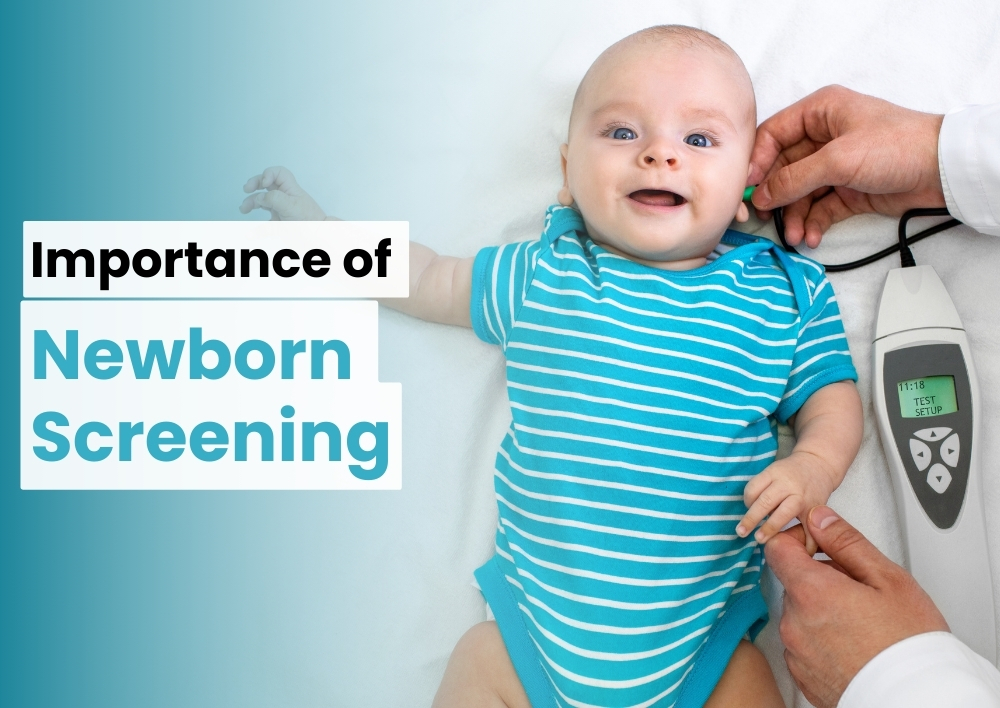Importance of Newborn Screening Tests
Welcoming a newborn into the world is a moment of immense joy and excitement, but it also brings responsibilities. One important step that cannot be ignored is newborn screening. This simple yet important process plays a significant role in ensuring your baby’s health and well-being. But what exactly is newborn screening, and why is it so important? In this blog post, the best pediatrician in gurgaon at Miracles Apollo Cradle/Spectra gives insight into the essentials of this practice and understands how it can make a difference in your baby's life.
What is Newborn Screening?
Newborn screening is a series of tests conducted shortly after birth to identify certain serious but treatable conditions in infants. Newborn screening tests are designed to detect disorders that may not be immediately clear but could have serious consequences if left untreated. The screening typically involves a blood test, and sometimes a hearing test and a heart test, depending on the protocols followed by the hospital.
Why is Newborn Screening Important?
According to research by the National Institutes of Health (NIH), In India, about 0.75 million neonates die every year. That's why newborn screening is important. Here are some benefits of newborn screening:
-
Early Detection of Disorders: Many conditions that newborn screening tests for are rare and may not show symptoms until they are quite advanced. Early detection through screening allows for immediate treatment, which can significantly improve the outcome and quality of life for the baby.
-
Prevent Serious Health Issues: Certain disorders, if not detected early, can lead to severe health problems, delayed development, or even life-threatening situations. Conditions like phenylketonuria (PKU) or congenital hypothyroidism can cause harm if not addressed early.
-
Provides Peace of Mind: Knowing that your baby has been screened for these conditions provides peace of mind. It reassures parents that their baby is healthy or if a condition is detected, that it will be managed effectively from the start.
-
Enables Early Intervention: Early treatment and intervention are key to addressing many of the conditions detected by newborn screening. Early treatment for conditions like congenital adrenal hyperplasia can help prevent serious complications and ensure normal development.
-
Reduce Long-Term Costs: Addressing conditions early can reduce the need for more extensive and expensive treatments later in life. Early intervention often leads to better outcomes and can minimize the long-term impact on the child’s health.
The Newborn Screening Process
A neonatal screening test is an important step in ensuring the health and well-being of a baby in the earliest stages of life. This process is typically carried out within the first few days after birth and aims to detect certain conditions that, if left untreated, can lead to serious health problems. The main newborn hearing tests are:
1. Blood Test: The blood test, also known as the heel prick test, is one of the most important parts of newborn screening. This test screens for a wide range of metabolic, genetic, and hormonal disorders. In this test, a small blood sample is collected by pricking the baby’s heel. The test is usually performed within 24 to 48 hours after birth, once the baby is 1 to 2 days old. This timing is important to ensure accurate results as some conditions can only be detected after the baby has started feeding and metabolizing nutrients.
What it screens for:
-
Metabolic disorders: These affect how the body processes food and nutrients, leading to problems such as phenylketonuria (PKU) or maple syrup urine disease (MSUD).
-
Genetic conditions: Disorders like cystic fibrosis or sickle cell disease can be detected through this test.
-
Hormonal imbalances: Congenital hypothyroidism, where the thyroid doesn’t produce enough hormones, can be identified early through this screening.
Early detection of these conditions can prevent severe health issues, such as intellectual disabilities, growth problems, and even death. Timely interventions, such as dietary adjustments or medication, can lead to normal development and quality of life.
2. Hearing Test: Hearing loss is one of the most common congenital disabilities. Early identification allows for interventions like hearing help or cochlear implants, which can support speech and language development. The newborn hearing test is often done within the first day or two after birth, usually while the baby is sleeping or calm.
There are two main types of newborn hearing tests:
-
Otoacoustic Emissions (OAE): A soft probe is placed in the baby’s ear canal to play a sound. If the inner ear is functioning properly, it will produce an echo in response, which is measured by the probe.
-
Automated Auditory Brainstem Response (AABR): Small sensors are placed on the baby’s head, and soft sounds are played through earphones. The sensors measure how the baby’s brain responds to these sounds.
3. Heart Test: The Pulse Oximetry test screens for critical congenital heart defects (CCHD). These are serious heart conditions present at birth that may not show immediate symptoms but can cause life-threatening complications if untreated. This non-invasive and painless test only takes a few minutes. This test is usually performed after 24 hours of birth, once the baby’s circulatory system has stabilized. A small sensor is placed on the baby’s hand or foot to measure oxygen levels in the blood.
Low oxygen levels can be a sign of heart defects such as hypoplastic left heart syndrome (HLHS) or transposition of the great arteries (TGA). These conditions affect how blood is pumped and oxygenated within the heart. If a heart defect is detected, the baby may require further tests, like echocardiograms, and potentially early surgical intervention to correct the issue before it becomes life-threatening.
Which Disorders Does Newborn Screening Test For?
Newborn screening tests for a variety of disorders, including but not limited to:
-
Metabolic Disorders:
-
Phenylketonuria (PKU): A condition where the body cannot process the amino acid phenylalanine, leading to brain damage if untreated.
-
Maple Syrup Urine Disease (MSUD): A metabolic disorder affecting the breakdown of certain amino acids, which can lead to severe neurological damage.
-
Homocystinuria: A condition affecting the metabolism of certain amino acids, leading to issues with the eyes, bones, and brain.
-
-
Endocrine Disorders:
-
Congenital Hypothyroidism: A condition in which the thyroid gland does not produce enough thyroid hormone, which can lead to delayed development and other health issues.
-
Congenital Adrenal Hyperplasia (CAH): A genetic disorder affecting the adrenal glands, leading to imbalances in hormones that can affect growth and development.
-
-
Hemoglobin Disorders:
-
Sickle Cell Disease: A genetic disorder where red blood cells become malformed, leading to various complications including pain and anemia.
-
Thalassemia: A group of inherited blood disorders affecting the production of hemoglobin, leading to anemia and other health issues.
-
-
Cystic Fibrosis: A genetic disorder affecting the respiratory and digestive systems, leading to thick mucus production that can cause lung infections and digestive problems.
-
Hearing Impairments: Newborn screening includes a hearing test to detect early signs of hearing loss, which can impact language development and social skills if not addressed.
-
Heart Conditions: Pulse oximetry testing is used to identify potential Critical Congenital Heart Disease that may not be obvious at birth but requires immediate attention.
When to see a Doctor for Newborn Screening?
Newborn screening is generally conducted within the first 24-48 hours after birth, but there are certain situations where it’s important to see a doctor or follow up on the results:
-
If Your Baby Missed the Initial Newborn Screening
-
Abnormal or Inconclusive Screening Results
-
Early Symptoms of Metabolic, Genetic, or Hormonal Disorders
-
If your baby fails the initial hearing screening or if you notice signs of hearing issues
-
If you notice any symptoms that may indicate a heart problem
Conclusion:
Newborn screening is an important part of modern healthcare that helps ensure the well-being of newborns by detecting potentially serious conditions early. By getting your baby's newborn screening done, you are securing your baby’s health and future. If you have any questions or concerns about newborn screening, don’t hesitate to discuss them with a pediatrician near you at Miracles Healthcare. Their guidance will help you navigate this important aspect of your baby’s early life with confidence and care.














Was the information useful?
0 0